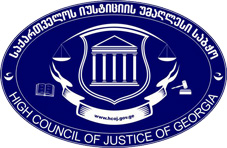
NGOs Say Body Responsible of Unbiased Judiciary Is Not Transparent
By Gvantsa Gabekhadze
Friday, June 29
The report prepared by two leading NGOs of Georgia says that the High Council of Justice, an independent body responsible for unbiased judiciary in Georgia, is not transparent and requires major changes.
The Georgian Young Lawyers` Association (GYLA) and Transparency International Georgia presented their sixth monitoring report of 2017 on Thursday, which reflects the activity of the High Council of Justice of Georgia.
The monitoring revealed that the Council failed to properly put the ,”Third Wave’’ of the Judicial System Reform into practice – judges were appointed with the same flaws, which the reform mentioned aimed to eradicate.
“The Council did not implement the positive changes included in the direction of disciplinary liability of judges, among them, an Independent Inspector was appointed with a substantial delay. The problem of all-out non acceptance of pluralism and a critical opinion still remains in the new composition of the Council that prevents subjective discussions and justification of decisions,” the report reads.
The NGOs say that the accountability system of judges still remains ineffective, adding it contains a threat to their independence.
“The newly elected judge members were considering the continuation of the path taken by the previous composition as the main priority of their activity, while majority of non-judge members could not reveal their individual visions and adequate consistency,” the report reads.
“Persecution of different opinions and demonstration of unhealthy power from the influential group of judges continued,” the NGOs say.
The report reads that the High Council of Justice remains closed to people.
“Information important to the public is still closed,” the report reads.
The NGOs say that the Council does not attempt staffing the Judiciary Corp with the new members.
“The Council appoints chairpersons of the court/panel/chamber in absence of relevant standards and procedures, chiefly in an uncompetitive environment,” the report says.
A non-judge member of the High Council of Justice Anna Dolidze, who frequently criticizes the Council activities, says that the parliament of Georgia must take steps to address the problems, otherwise the report will provide no results.
The High Council of Justice underwent major changes in 2013.
The High Council of Justice is now composed of 15 members.
8 members are elected by the self-governing body of judges, 5 members -by the Parliament of Georgia and one member is appointed by the president.
The HCOJ was created to coordinate the judiciary system and to promote the effectiveness and independence of the judiciary.
The main responsibilities of the HCOJ include the organization of qualification exams of judges, selection and appointment of judges of trial and appellate courts, disciplinary proceedings, legislative drafting and analytical work, quality management and relationship with the public.


